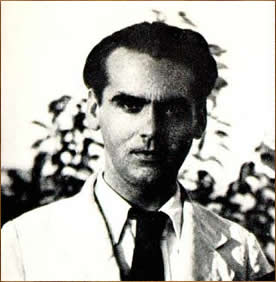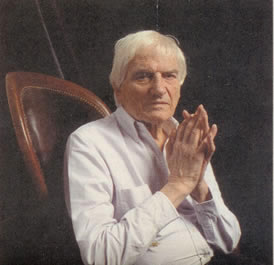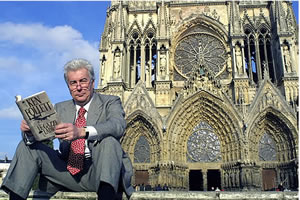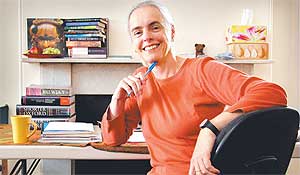|
De Spaanse dichter en toneelschrijver Federico Garcia Lorca werd geboren op 5 juni 1898 in Fuente Vaqueros, Granada. Zie ook alle tags voor Federico Garcia Lorca op dit blog.
DE KREET
De ellips van een kreet
slaat van berg
naar berg.
Vanuit de olijfgaarden
wordt hij een zwarte regenboog
over de blauwe nacht.
Ay!
Als de strijkstok van een altviool
liet de kreet de lange snaren
van de wind trillen.
Ay!
(De grotbewoners komen
met hun lampen naar buiten.)
Ay!
VERWONDERING
Dood bleef hij liggen op straat
met een dolk in zijn borst.
Niemand die hem kende.
Wat trilde de lantaarn!
Moeder.
Wat trilde het lantaarntje
op straat!
Bij dageraad. Niemand
kon nog in zijn ogen kijken
die staarden in de harde lucht.
Ja, dood bleef hij liggen op straat,
en met een dolk in zijn borst
en niemand, niemand die hem kende.
Vertaald door Bart Vonck
Casida der dunklen Tauben
Durch die Äste des Lorbeers hindurch
sah ich zwei dunkle Tauben.
Die eine war die Sonne,
die andere der Mond.
Kleine Nachbarn, sagte ich zu ihnen,
wo ist mein Grab?
In meinem Schwanz, sagte die Sonne.
In meiner Kehle, sagte der Mond.
Und ich, der ich bis zum Gürtel
in der Erde ging,
sah zwei Adler aus Marmor
und ein nacktes Mädchen.
Der eine war der andere,
und das Mädchen war keines.
Kleine Adler, sagte ich zu ihnen:
wo ist mein Grab?
In meinem Schwanz, sagte die Sonne.
In meiner Kehle, sagte der Mond.
Durch die Äste des Lorbeers hindurch
sah ich zwei nackte Tauben.
Die eine war die andere,
und beide waren keine.
Vertaald door Johannes Beilharz

Federico García Lorca (5 juni 1898 19 augustus 1936)
De Nederlandse dichter en schrijver Adriaan Morriën werd geboren op 5 juni 1912 in Amsterdam. Zie ook alle tags voor Adriaan Morriën op dit blog.
Geestelijke
Zijn leven is gebed en mis geworden.
In 't duister van de kerk schrikt hij nog zelden
terug tot achter deze vrome orde.
't Verleden rinkelt soms in altaarschellen.
God is verneveld tot een log geheel
van plichten en 't verzaken van die plichten;
tot overvloed van heiligen-gezichten:
nog steeds te weinig en al lang te veel.
Er is een honger die zichzelf niet kent.
Een moeheid die tevredenheid voorwendt.
Soms denkt hij aan het leven na dit leven
als aan een ziekte die nooit zal genezen.
Hij heeft zijn handen naar het crucifix geheven.
Maar Jezus aan het kruis kan niet zo eenzaam wezen.
Fabrieksjongen
Het licht ruist door de hoge glazen wanden.
Een jongen vijlt verwoed zijn eerste ijzer
En doet het met de glimlach van de plicht,
Niet wijzer dan toen hij speelde in een ander licht,
Zijn eerste woorden leerde en zijn eerste stappen deed
Over een uitgesleten kleed, aan een te blijde hand.
Maar nu is hij bevriend met mannen en machines
En 's avonds strekt hij zich naast een te mager meisje uit.
Er is een kalme tijdeloosheid in de lucht,
Een vliegwiel dat zijn wentelingen mindert
Zonder dat het de speelse voortgang hindert.
Hij voelt de ongefabriceerde zachtheid van haar hand.
Hij kust haar en zij proeft een smaak van ijzer.
Het is hun eerste misverstand.

Adriaan Morriën (5 juni 1912 7 juni 2002)
De Engelse schrijver Ken Follett werd geboren op 5 juni 1949 in Cardiff, Wales. Zie ook alle tags voor Ken Follett op dit blog.
Uit: A Place Called Freedom
Snow crowned the ridges of High Glen and lay on the wooded slopes in pearly patches, like jewellery on the bosom of a green silk dress. In the valley bottom a hasty stream dodged between icy rocks. The bitter wind that howled inland from the North Sea brought flurries of sleet and hail. Walking to church in the morning the McAsh twins, Malachi and Esther, followed a zigzag trail along the eastern slope of the glen. Malachi, known as Mack, wore a plaid cape and tweed breeches, but his legs were bare below the knee, and his feet, without stockings, froze in his wooden clogs. However, he was young and hot-blooded, and he hardly noticed the cold. This was not the shortest way to church but High Glen always thrilled him. The high mountainsides, the quiet mysterious woods and the laughing water formed a landscape familiar to his soul. He had watched a pair of eagles raise three sets of nestlings here. Like the eagles, he had stolen the lairds salmon from the teeming stream. And, like the deer, he had hidden in the trees, silent and still, when the gamekeepers came. The laird was a woman, Lady Hallim, a widow with a daughter. The land on the far side of the mountain belonged to Sir George Jamisson, and it was a different world. Engineers had torn great holes in the mountainsides; man-made hills of slag disfigured the valley; massive wagons loaded with coal ploughed the muddy road; and the stream was black with dust. There the twins lived, in a village called Heugh, a long row of low stone houses marching uphill like a staircase.
They were male and female versions of the same image. Both had fair hair blackened by coal dust, and striking pale-green eyes. Both were short and broad-backed, with strongly muscled arms and legs. Both were opinionated and argumentative.
Arguments were a family tradition. Their father had been an all-round nonconformist, eager to disagree with the government, the church or any other authority. Their mother had worked for Lady Hallim before her marriage, and like many servants she identified with the upper class.

Ken Follett (Cardiff, 5 juni 1949)
De Australische schrijfster Margo Lanagan werd geboren op 5 juni 1960 in Waratah, New South Wales. Zie ook alle tags voor Margo Lanagan op dit blog.
Uit: Black Juice
We all went down to the tar pit, with mats to spread our weight.
Ikky was standing on the bank, her hands in a metal twin loop behind her. She'd stopped sulking; now she looked, more, starey and puzzled.
Chief Barnarndra pointed to the pit. "Out you go then, girl. You must walk on out there to the middle and stand. When you picked a spot, your people can join you."
So Ik stepped out, very ordinary. She walked out. I thought -- hoped, even -- she might walk right across and into the thorns the other side; at the same time, I knew she wouldn't do that.
She walked the way you walk on the tar, except without the arms balancing. She nearly fell from a stumble once, but Mumma hullooed to her, and she straightened and walked upright out to the very middle, where she slowed and stopped.
Mumma didn't look to the chief, but all us kids and the rest did. "Right, then," he said.
Mumma stepped out as if she'd just herself that moment happened to decide to. We went after her -- only us, Ik's family, which was like us being punished, too, everyone watching us walk out to that girl who was our shame.
In the winter you come to the pit to warm your feet in the tar. You stand long enough to sink as far as your ankles -- the littler you are, the longer you can stand. You soak the heat in for as long as the tar doesn't close over your feet and grip, and it's as good as warmed boots wrapping your feet. But in summer, like this day, you keep away from the tar, because it makes the air hotter and you mind about the stink.
But today we had to go out, and everyone had to see us go.
Ikky was tall, but she was thin and light from all the worry and prison; she was going to take a long time about sinking. We got our mats down, all the food parcels and ice baskets and instruments and such spread out evenly on the broad planks Dash and Felly had carried out.

Margo Lanagan (Waratah, 5 juni 1960)
Zie voor nog meer schrijvers van de 5e juni ook mijn vorige blog van vandaag.
05-06-2012 om 21:58
geschreven door Romenu 
Tags:Federico García Lorca, Adriaan Morriën, Ken Follett, Margo Lanagan, Romenu
|

